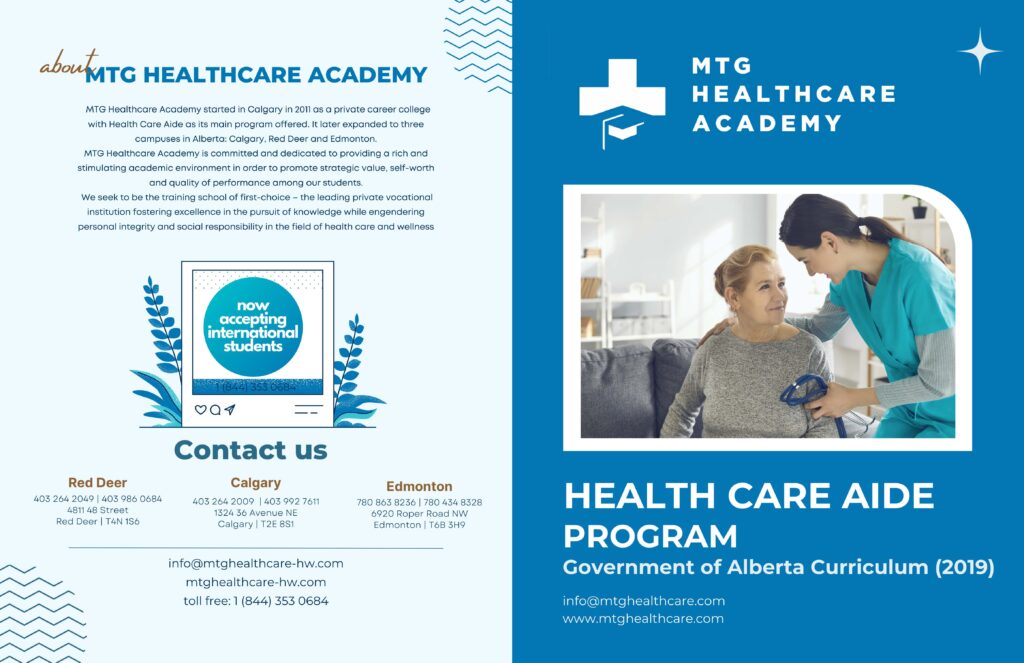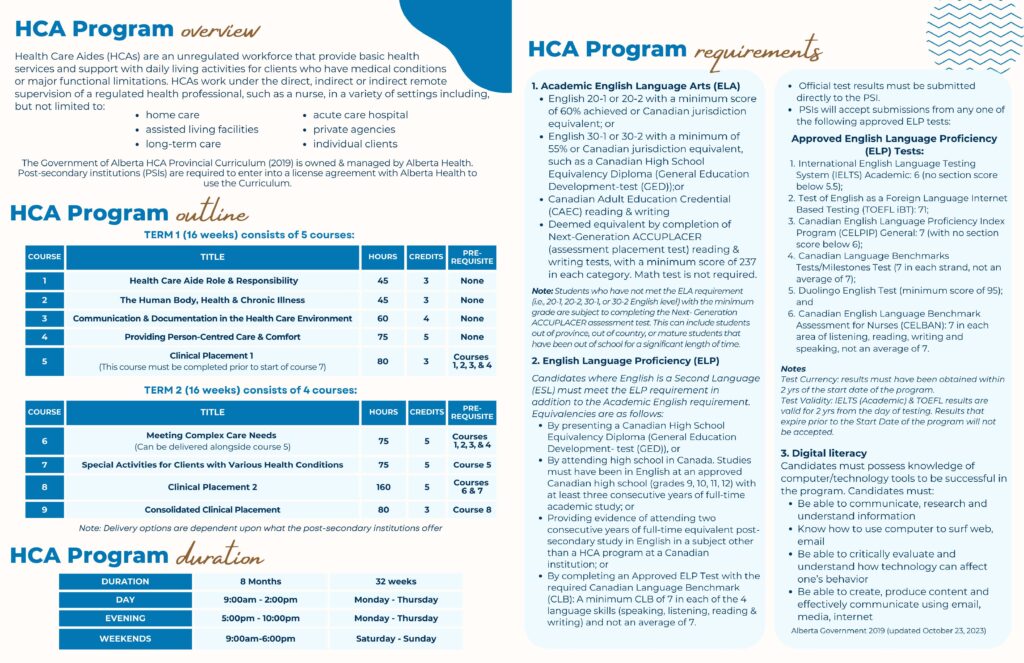

Health Care Aide Program
Health Care Aide (HCAs) are an unregulated workforce that provide basic health services and support with daily living activities for clients who have medical conditions or major functional limitations. HCAs work under the direct, indirect remote supervision of a regulated health professional, such as a nurse, in a variety of settings including, but not limited to:
- home care
- assisted living facilities
- long-term care
- acute care hospitals
- private agencies
- individual clients
The Government of Alberta HCA Provincial Curriculum (2019) is owned and managed by Alberta Health. Post-secondary institutions (PSIs) are required to enter into a license agreement with Alberta Health to use the Curriculum.
Health Care Aide Program Entry Requirements
The following requirements must be met to be eligible for entry for a licensed HCA program.
1. Academic English Language Arts (ELA)
English 20-1 or 20-2 with a minimum of 60% achieved or Canadian jurisdiction equivalent;
OR
- English 30-1 or 30-2 with a minimum of 55%; or Canadian jurisdiction equivalent such as a Canadian High School Equivalency Diploma; General Education Development-test (GED); or Canadian Adult Education Credential (CAEC)
- Deemed equivalent by completion of Next-Generation ACCUPLACER (assessment placement test) reading and writing tests, with a minimum score of 237 in each category. The math test is not required.
Note : Students who have not met the ELA requirement (i.e., 20-1, 20-2, 30-1, or 30-2 English level) with the minimum grade are subject to completing the Next-Generation ACCUPLACER assessment test. This can include students out of province, out of country, or mature students that have been out of school for a significant length of time.
Road Map:
Health Care Aide Curriculum (2019)
2. English Language Proficiency (ELP)
Candidates where English is a Second Language (ESL) must meet the English Language Proficiency requirement in addition to the Academic English requirement. Equivalencies are as follows:
- By presenting a Canadian High School Equivalency Diploma (General Education Development- test (GED), or
- By attending high school in Canada. Studies must have been in English at an approved Canadian high school (Grade 9, 10, 11, 12) with at least three consecutive years of full-time academic study; or
- Providing evidence of attending two consecutive years of full-time equivalent post-secondary study in English in a subject other than a HCA program at a Canadian institution; or
- By completing an Approved ELP Test with the required Canadian Language Benchmark (CLB); A minimum CLB of 7 in each of the 4 language skills (speaking, listening, reading and writing) and not an average of 7.
- Official test results must be submitted directly to the PSI.
- PSIs will accept submissions from any one of the following approved ELP tests:
Approved English Language Proficiency (ELP) Tests:
- International English Language Testing System (IELTS) Academic: 6 (no section score below 5.5);
- Test of English as a Foreign Language Internet Based Testing (TOEFL iBT): 71;
- Canadian English Language Proficiency Index Program (CELPIP) General: 7 (with no section score below 6);
- Canadian Language Benchmark Tests/Milestones Test (7 in each strand, not an average of 7);
- Duolingo English Test (minimum score of 95); and
- Canadian English Language Benchmark Assessment for nurses (CELBAN): 7 in each area of listening, reading, writing and speaking, not and average of 7.
Notes
Test Currency: results must have been obtained within two years of the start date of the program. Test Validity: IELTS (Academic) and TOEFL results are valid for two years from the day of testing. Results that expire prior to the Start Date of the program will not be accepted.
3. Digital Literacy
Candidates must possess knowledge of computer/technology tools to be successful in the program. Candidates must:
- Be able to communicate, research and understand information
- Know how to use computer to surf web, email
- Be able to critically evaluate and understand how technology can affect one’s behaviour
- Be able to create, produce content and effectively communicate using email, media, internet
Program Structure
The Government of Alberta HCA Provincial Curriculum (2019) consists of 41 modules delivered through 9 courses, as further described in Appendix B – Modules of the Health Care Aide License Agreement. The following is an example program structure:
- TERM 1 (16 weeks) consists of 5 courses:
- Course 1: Health Care Aide Role & Responsibility
- Hours 45
- Credits 3
- Prerequisites: None
- Course 2: The Human Body, Health & Chronic Illness
- Hours 45
- Credits 3
- Prerequisites: None
- Course 3: Communication & Documentation in the Health care Environment
- Hours 60
- Credits 4
- Prerequisites: None
- Course 4: Providing Person-Centered Care & Comfort
- Hours 75
- Credits 5
- Prerequisites: None
- Course 5: Clinical Placement 1 (This course must be completed prior to the start of Course 7)
- Hours 80
- Credits 3
- Prerequisites: Courses 1,2,3, and 4
- Course 1: Health Care Aide Role & Responsibility
- Term 2(16 Weeks) consists of 4 courses:
- Course 6: Meeting Complex Care Needs
- Hours 75
- Credits 5
- Prerequisites: Courses 1,2,3, and 4 (Can be delivered alongside Course 5)
- Course 7: Special Activities for Clients with Various Health Conditions
- Hours 75
- Credits 5
- Prerequisites: Courses 5
- Course 8: Clinical Placement 2
- Hours 160
- Credits 5
- Prerequisites: Courses 6 & 7
- Course 9: Consolidated Clinical Placement
- Hours 80
- Credits 3
- Prerequisites: Course 8
- Course 6: Meeting Complex Care Needs
Note: Delivery options are dependent upon what the post-secondary institutions offer.
Alberta Government 2019(Updated October 7, 2024)